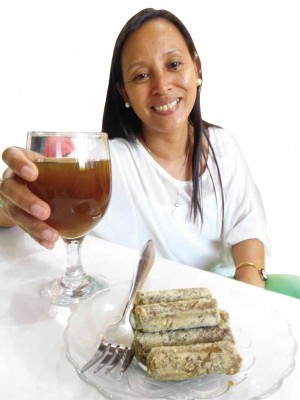The wonders of ‘Dok Alternatibo’

An employee at a Dok Alternatibo clinic shows the health drink turmeric juice and camote rolls that form part of the natural food program of the thriving health enterprise. GERMELINA LACORTE
Edgar Delibo’s foray into alternative medicine was driven by the search for a cure to his wife’s many ailments.
“She had asthma since she was a child. She had myoma after childbirth. She was diagnosed with a rheumatic heart, hypertension and hyperthyroidism. She had insomnia, migraine and a lot more,” said Delibo, who is now known here as “Dok Alternatibo.”
Doctors told the family that they had only two options—surgery or maintenance drugs. Delibo, however, refused to accept that he was limited to the two choices.
“The cost of operation was so huge for a media man to afford, so I started to look for solutions somewhere else,” said Delibo, who had worked as a broadcaster before his involvement in alternative medicine.
He spent long hours doing research on the Internet and reading medical books, but they simply corroborated what doctors had told him about his wife’s ailments—the choices were just surgery and maintenance drugs.
‘Eyes of faith’
“It was only when I stopped my search using my eyes and began to search using the eyes of faith that I began to see,” Delibo said.
He said a “voice” inside him kept telling him that “the very food that they (doctors) don’t allow patients to eat may be the ones that can bring about healing.”
So while doctors told him root crops were bad for patients with toxic goiter, which his wife had, he gave his wife camote, pounding it and mixing it with scraped coconut meat.
“It was so delicious. I called it camote delight, because I was delighted with the results,” Delibo said, recalling how his wife’s health gradually improved.
The couple changed their eating habits, preferring to take plenty of water to replace heavy meals in the morning and completely staying away from medication and maintenance drugs.
Three years later, Delibo’s wife became pregnant. Her myoma, heart ailment and asthma became a thing of the past.
“When we fell in love with herbal healing, it was the turning point,” he said.
Boom
Delibo was encouraged to go deeper into the study of alternative medicine by the Davao Inventors Association.
Starting with a P20,000 loan from Quedan and Rural Credit Guarantee Corp., Delibo set up a clinic in a 3 x 3 meter room in Matina district here. It served as his home, too.
After barely three years, he was able to open 40 branches. Nowadays, Delibo, or Dok Alternatibo, has more than 80 branches nationwide including in areas as far as Zamboanga City in Western Mindanao in the south to Dagupan City in the north.
Delibo attributed the growth of his venture to faith and positive thinking. “It’s business with passion,” he said. “God provided everything else,” he added.
He hadn’t thought of branching out to General Santos City until a patient, who cannot afford to go to Davao to seek treatment, asked him to open a branch there.
“I told him, help me find a space, and he helped me, and that was how we also expanded in the area,” Delibo said.
“Because of their happiness, people started to talk about it, and the news about natural healing spread by word of mouth,” he added.
In Tupi, Maguindanao province, a village councilor brought a van full of patients to Delibo’s clinic.
The airwaves helped promote Dok Alternatibo. At least 20 radio stations nationwide are airing testaments to his healing wonders.
No to chemicals
Delibo said that for alternative medicine to succeed, all drug treatments should be stopped.
Some people who are terminally ill go to Dok Alternatibo’s clinics, too, where they are given detoxification treatments to rid their bodies of chemicals from drugs. It’s mostly about water and natural food.
Less than a year after joining the Davao Inventors Association, Dok Alternatibo got a patent for an eye wash for people suffering from glaucoma.
At least 18 more patents were acquired for several more products. Among these is a multivitamin capsule Delibo called FulVic.
In 2009, FulVic won second prize in the Ambassador Alfredo M. Yao intellectual property innovation contest as an antihypertensive and antidiabetic herbal formula and a food supplement that promotes good health.
“It’s what I call business with passion,” he said. “I love to share what I discover. People who listen and follow become the first clients and they become the multiplier,” he added.
China lessons
As soon as he opened his clinic in 2007, Delibo looked for a school where he can learn more about alternative medicine and found Zhongfang Red Cross International Hospital in Hunan, China.
There, he studied the science of prescription, advanced acupuncture, the science of Chinese materia medica, the basic theory of traditional medicine and the diagnostics of traditional Chinese medicine in a four-year combined distance and actual learning course he finished in 2011.
His only lament is that despite the Traditional and Alternative Medicine Act (Republic Act No. 8423), which was enacted in 1997, no school on Filipino traditional medicine has been established in the country.
The law created the Philippine Institute of Traditional and Alternative Health Care supposedly to accelerate the development of traditional and alternative healthcare in the country and provide funds for this.
Not one of the institute’s directors, however, practices alternative medicine.














